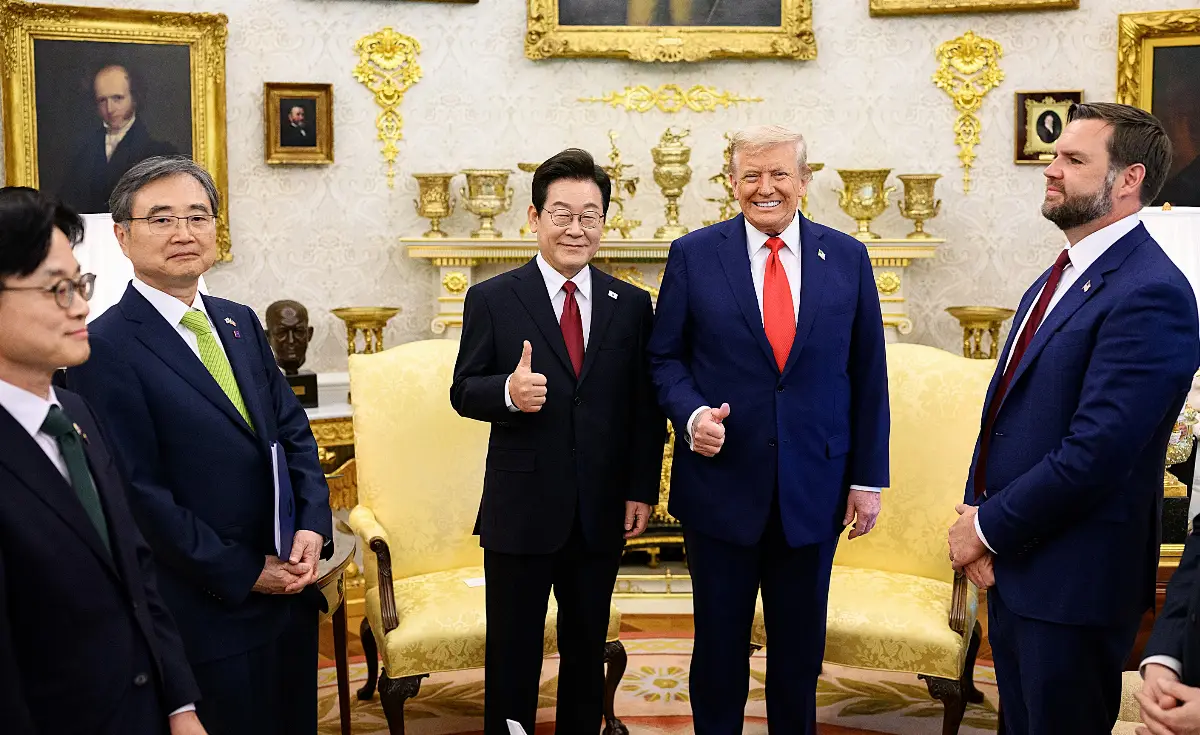
Tariffs. USA-South Korea: new "historic" trade agreement signed
The air transport, space and automotive industries among the key sectors involved

Trump celebrates the "largest deal ever signed" that provides for 15% tariffs on South Korean goods in exchange for massive investments and full opening to the USA market
An economic agreement that redefines trade relations between Washington and Seoul was signed at the White House yesterday, August 25, 2025. US President Donald Trump and his South Korean counterpart Lee Jae Myung finalized the deal, which the American President described as "the largest ever signed" and for which he had to "overcome Seoul's resistance".
The agreement, whose details had already been previewed by Trump on his social platform "Truth", provides for a radical change in tariff relations: the United States will impose a 15% duty on all goods coming from South Korea, while American exports to the Asian country will not be subject to any tariffs.
Under the terms of the deal, South Korea commits to provide the United States with 350 billion dollars in investments selected directly by the American President. In addition, Seoul will purchase 100 billion dollars worth of Liquefied Natural Gas (LNG) or other energy products of American origin.
Confirming the epochal nature of the agreement, 11 Memoranda of Understanding were signed involving the leading industrial powerhouses of both Countries. The roundtable was attended by 16 South Korean top managers and 21 American executives. Among the prominent figures were Euisun Chung of Hyundai Motor Group and Lee Jae-yong of Samsung Electronics for the Korean delegation, and Jensen Huang (Nvidia) and David Rubenstein (Carlyle Group) for the American one. The joint commitment focuses in particular on the aviation, space, and automotive sectors. The agreement provides for the full opening of the South Korean market to American products, including vehicles, trucks, and agricultural goods, while the aerospace sector will see strengthened cooperation between airlines, manufacturers, and the supply chain, including for research and development projects.
Specifically, the most relevant key industries in the aviation and automotive sectors involved in the agreement are:
Automotive sector
- Hyundai Motor Group: the presence of Executive Chairman Euisun Chung at the meeting confirms the central role of the automotive group in the deal. While not specifying exact figures, the agreement is aimed at guaranteeing Hyundai access to the US market and avoiding punitive tariffs that could have prompted the company to rethink its supply chains and production plans in the United States, where major investment projects are already underway.
Aviation sector
- Korean Air: South Korea's flagship carrier is at the center of a strategic move that sees it committing to a massive aircraft order. Specifically, Korean Air has signed an agreement with the American giant Boeing to purchase 103 next-generation aircraft, a contract estimated to be worth over 50 billion dollars (see AVIONEWS 1 and 2).
- Boeing: as the main aircraft supplier for Korean Air, the American manufacturer is one of the biggest beneficiaries of the agreement, which strengthens its position in the Asian market. The order includes key models such as the -777/9, the -787/10, the -737/10 and the B-777/8F (cargo).
- GE Aerospace: the American aircraft engine manufacturer is another key player in the deal, as it will supply the engines and long-term maintenance support for Korean Air's new aircraft, under a contract worth several billion dollars.
- Hanwha Aerospace: although not directly involved in the civil air transport contracts like Korean Air and Boeing, Hanwha is an important South Korean aerospace company. Based on the information available, its involvement in the agreement is tied to broader strategic cooperation in the sector, particularly for the production of advanced components and systems.
The agreements also include an important component related to the space sector
The memoranda of understanding signed yesterday provide for enhanced cooperation for the exploration and development of Space. The goal is to combine American expertise in exploration and launch technologies with South Korean innovation in satellite systems, artificial intelligence, and precision component manufacturing. In particular:
- Collaboration on launch vehicles and satellites: the aerospace industries of the two countries will work together on joint research and development projects for launch systems and for the next generation of communications and Earth-observation satellites.
- Artificial intelligence and high-performance computing: the meeting was attended by Jensen Huang, CEO of Nvidia, whose technology is crucial for data processing and AI applications, which are essential for spacecraft autonomy and for satellite image analysis.
- Involvement of Hanwha Aerospace: in addition to its role in the aeronautical sector, Hanwha is a leading player in South Korea's space industry, with expertise in the production of propulsion systems and satellites that makes it an ideal strategic partner for American counterparts.
AVIONEWS - World Aeronautical Press Agency